engine BUICK REGAL 1998 Owners Manual
[x] Cancel search | Manufacturer: BUICK, Model Year: 1998, Model line: REGAL, Model: BUICK REGAL 1998Pages: 388, PDF Size: 20.19 MB
Page 294 of 388
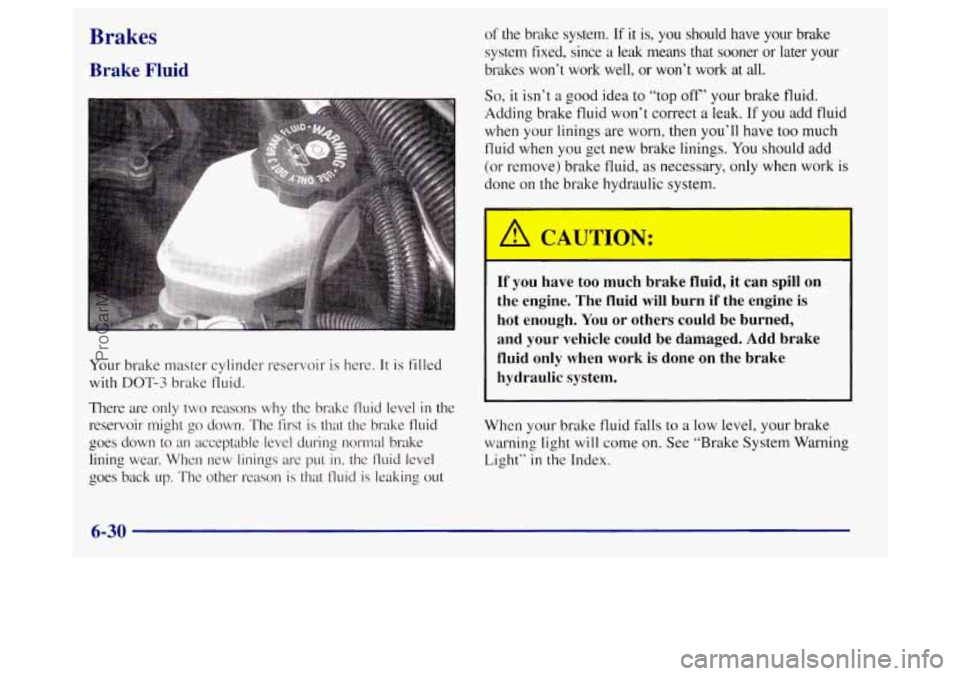
Brakes
Brake Fluid
Your brake master cylinder reservoir is here. It is filled
with
DOT-3 brake fluid.
There are only two reasons
why the brake fluid level in the
reservoir might
go down. The first is that the brake fluid
goes down to an acceptable level during normal brake
lining wear. When new linings are put in, the fluid level
goes back up. The other reason is that fluid is leaking out
of the brake system. If it is, you should have your brake
system fixed, since
a leak means that sooner or later your
brakes won’t work well, or won’t work at
all.
So, it isn’t a good idea to “top off’ your brake fluid.
Adding brake fluid won’t correct a leak.
If you add fluid
when your linings are worn, then you’ll have too much
fluid when you get new brake linings.
You should add
(or remove) brake fluid, as necessary, only when work
is
done on the brake hydraulic system.
’ A CAUTION:
F-
If you have too much brake fluid, it can spill on
the engine. The fluid will burn if the engine is
hot enough.
You or others could be burned,
and your vehicle could be damaged. Add brake
fluid only when work is done on the brake
hydraulic system.
When your brake fluid falls to a low level, your brake
warning light
will come on. See “Brake System Warning
Light”
in the Index.
6-30
ProCarManuals.com
Page 295 of 388
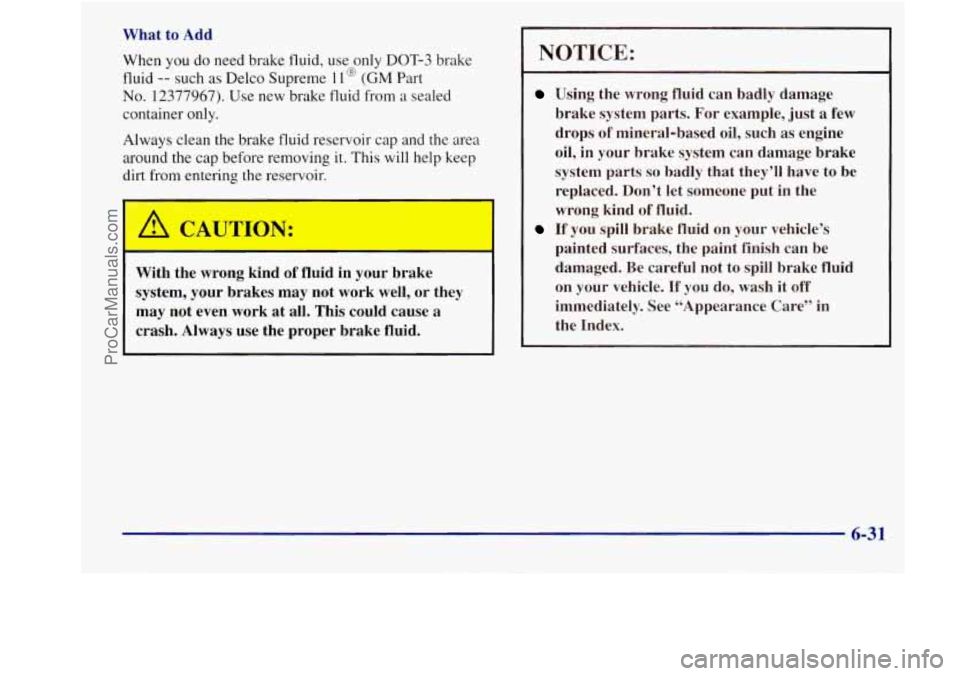
What to Add
When you do need brake fluid, use only DOT-3 brake
fluid
-- such as Delco Supreme 1 l@ (GM Part
No. 12377967). Use new brake fluid from a sealed
container only.
Always clean
the brake fluid reservoir cap and the area
around the cap before removing it. This will help keep
dirt from entering the reservoir.
With the wrong kind of fluid in your brake
system, your brakes may not work well, or they
may not even work at all. This could cause a
crash. Always use the proper brake fluid.
1
NOTICE:
Using the wrong fluid can badly damage
brake system parts. For example, just a few
drops
of mineral-based oil, such as engine
oil, in your brake system can damage brake
system parts
so badly that they’ll have to be
replaced. Don’t let someone put in the
wrong kind
of fluid.
If you spill brake fluid on your vehicle’s
painted surfaces, the paint finish can be
damaged. Be careful not to spill brake fluid
on your vehicle.
If you do, wash it off
immediately. See “Appearance Care’’ in
the Index.
6-31
ProCarManuals.com
Page 324 of 388
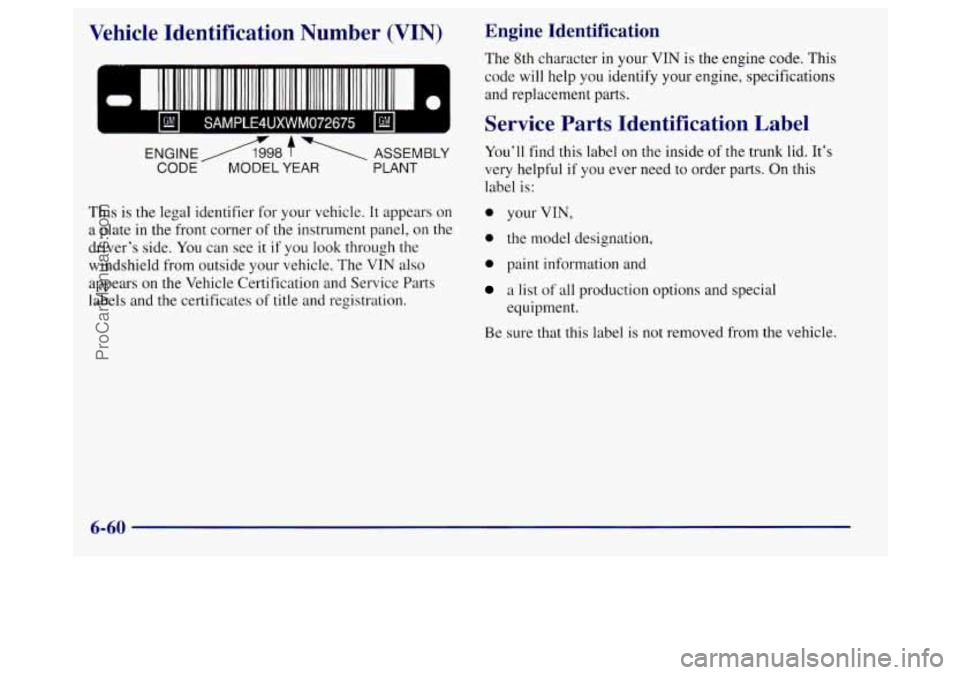
Vehicle Identification Number (VIN)
IIIIIIIIIIIII 11l1111111111I IIIIIIIIIIIIIIII1111IIIIIIIIIIII
7.
ENGINE/l&8 f - ASSEMBLY
CODE MODEL YEAR PLANT
This is the legal identifier for your vehicle. It appears on
a plate in the front corner of the instrument panel, on the
driver’s side.
You can see it if you look through the
windshield from outside your vehicle. The
VIN also
appears on the Vehicle Certification and Service Parts
labels and the certificates of title and registration.
Engine Identification
The 8th character in your VIN is the engine code. This
code will help you identify your engine, specifications
and replacement parts.
Service Parts Identification Label
You’ll find this label on the inside of the trunk lid. It’s
very helpful if you ever need to order parts.
On this
label is:
0 your VIN,
0 the model designation,
0 paint information and
a list of all production options and special
equipment.
Be sure that this label is not removed from the vehicle.
6-60
ProCarManuals.com
Page 328 of 388
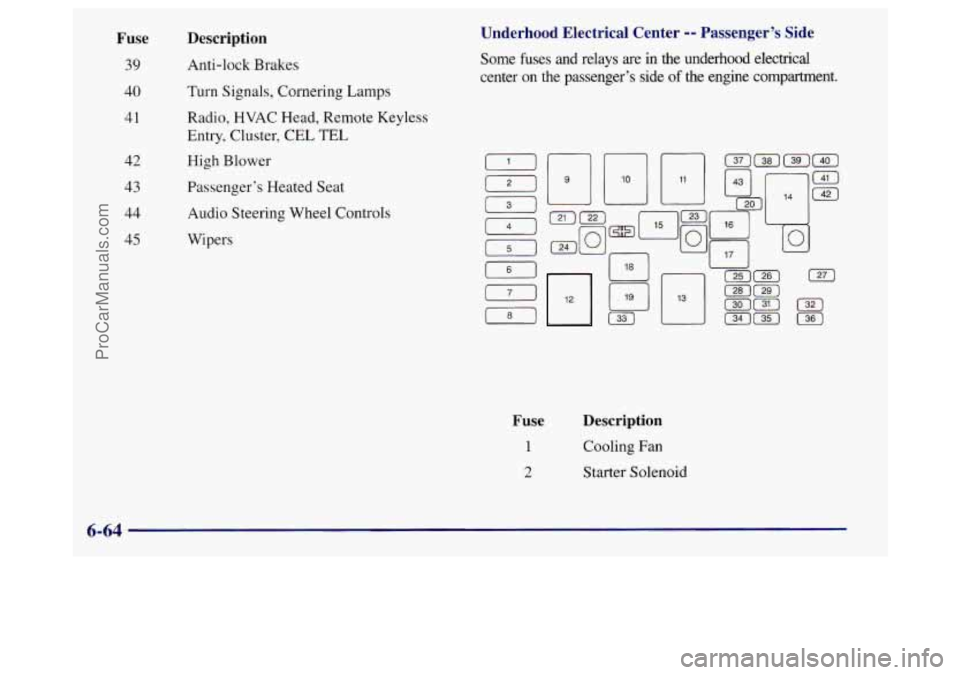
Fuse
39
40
41
42
43
44
45
Description
Anti-lock Brakes
Turn Signals, Cornering Lamps
Radio, HVAC Head, Remote Keyless
Entry, Cluster, CEL
TEL
High Blower
Passenger’s Heated Seat
Audio Steering Wheel Controls
Wipers
Underhood Electrical Center -- Passenger’s Side
Some fuses and relays are in the underhood electrical
center on the passenger’s side
of the engine compartment.
m
121
13)
14)
15)
(81
17)
[8)
Fuse
1
2
Description
Cooling Fan
Starter Solenoid
6-64
ProCarManuals.com
Page 330 of 388
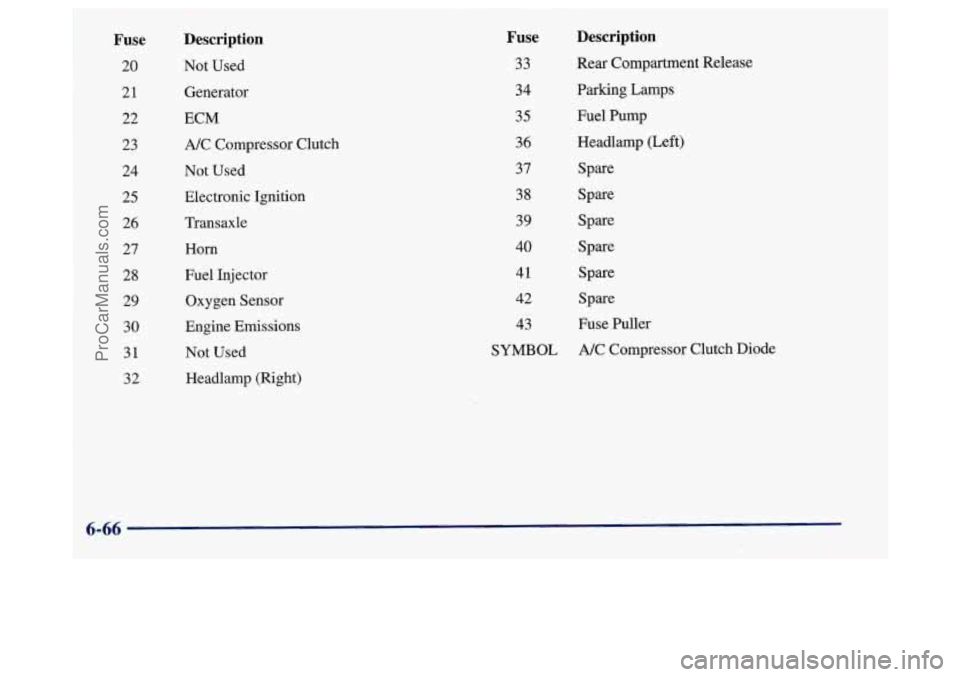
Fuse
20
21
22 23
24 25
26 27
28
29
30
31 32
Description
Not Used
Generator
ECM
A/C Compressor Clutch
Not Used Electronic Ignition
Transaxle
Horn
Fuel Injector
Oxygen Sensor
Engine Emissions
Not Used
Headlamp (Right)
Fuse
33
34 35
36 37
38
39
40
41
42
43
SYMBOL
Description
Rear Compartment Release
Parking Lamps Fuel Pump
Headlamp (Left) Spare Spare
Spare
Spare Spare
Spare
Fuse Puller A/C Compressor Clutch Diode
ProCarManuals.com
Page 331 of 388
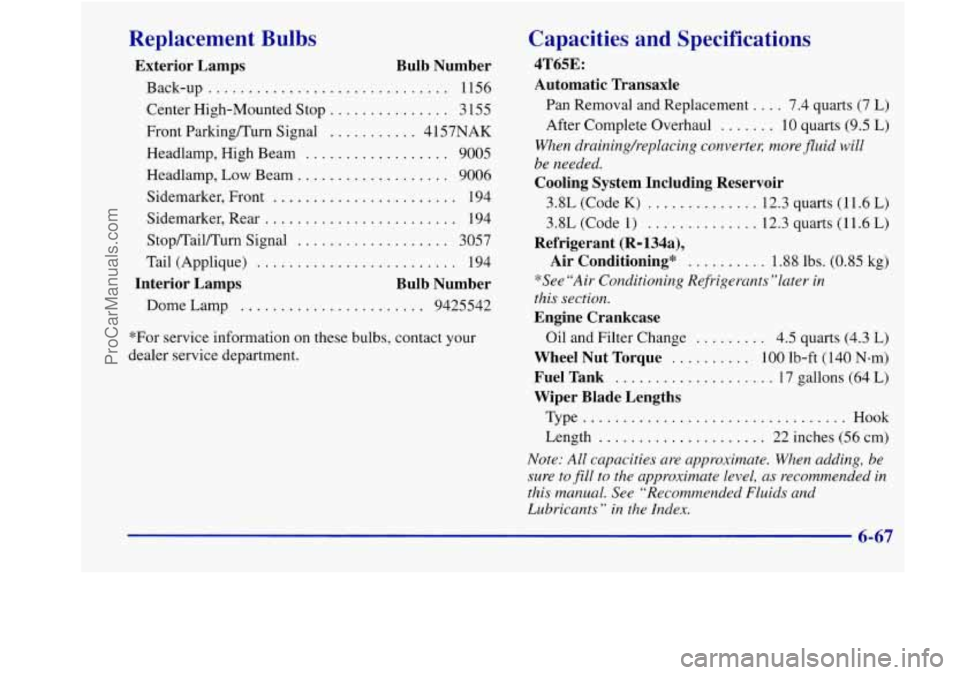
Replacement Bulbs
Exterior Lamps Bulb Number
Back-up .............................. 1156
Center High-Mounted Stop
............... 3155
Front Parking/Turn Signal
........... 4 157NAK
Headlamp, High Beam
.................. 9005
Headlamp, Low Beam.
.................. 9006
Sidemarker, Front ....................... 194
Sidemarker, Rear
........................ 194
Stop/Tail/Turn Signal
................... 3057
Tail (Applique)
....................... 194
Interior Lamps Bulb Number
Dome Lamp ....................... 9425542
*For service information on these bulbs, contact your
dealer service department.
Capacities and Specifications
4T65E:
Automatic Transaxle
Pan Removal and Replacement .... 7.4 quarts (7 L)
After Complete Overhaul
....... 10 quarts (9.5 L)
When drainingheplacing converter; more fluid will
be needed.
Cooling System Including Reservoir
3.8L (Code K) .............. 12.3 quarts (11.6 L)
3.8L (Code 1)
.............. 12.3 quarts (11.6 L)
Air Conditioning* .......... 1.88 lbs. (0.85 kg)
Refrigerant (R-l34a),
*See “Air Conditioning Refrigerants ”later in
this section.
Engine Crankcase
Oil and Filter Change ......... 4.5 quarts (4.3 L)
Wheel Nut Torque .......... 100 lb-ft (140 N-m)
Fuel Tank .................... 17 gallons (64 L)
Wiper Blade Lengths
Type ................................. Hook
Length ..................... 22 inches (56 cm)
Note: All capacities are approximate. When adding, be
sure
to fill to the approximate level, as recommended in
this manual. See “Recommended Fluids and
Lubricants” in the Index.
ProCarManuals.com
Page 332 of 388
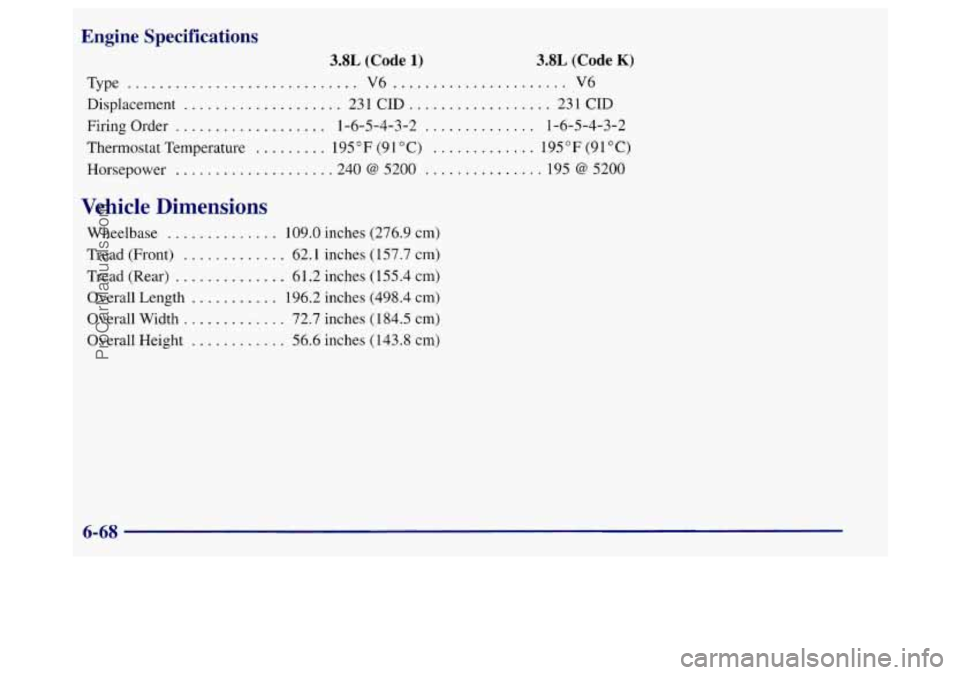
Engine Specifications
3.8L (Code 1) 3.8L (Code K)
Type ............................. V6 ...................... V6
Displacement .................... 23 1 CID .................. 23 1 CID
Thermostat Temperature
......... 195°F (91°C) ............. 195°F (91°C)
Firing
Order
................... 1-6-5-4-3-2 .............. 1-6-5-4-3-2
Horsepower
................... .240 0 5200 ............... 195 0 5200
Vehicle Dimensions
Wheelbase .............. 109.0 inches (276.9 cm)
Tread (Front)
............. 62.1 inches (157.7 cm)
Tread (Rear)
.............. 6 1.2 inches ( 155.4 cm)
Overall Length
........... 196.2 inches (498.4 cm)
Overall Width ............. 72.7 inches (1 84.5 cm)
Overall Height
............ 56.6 inches (143.8 cm)
6-68
ProCarManuals.com
Page 333 of 388
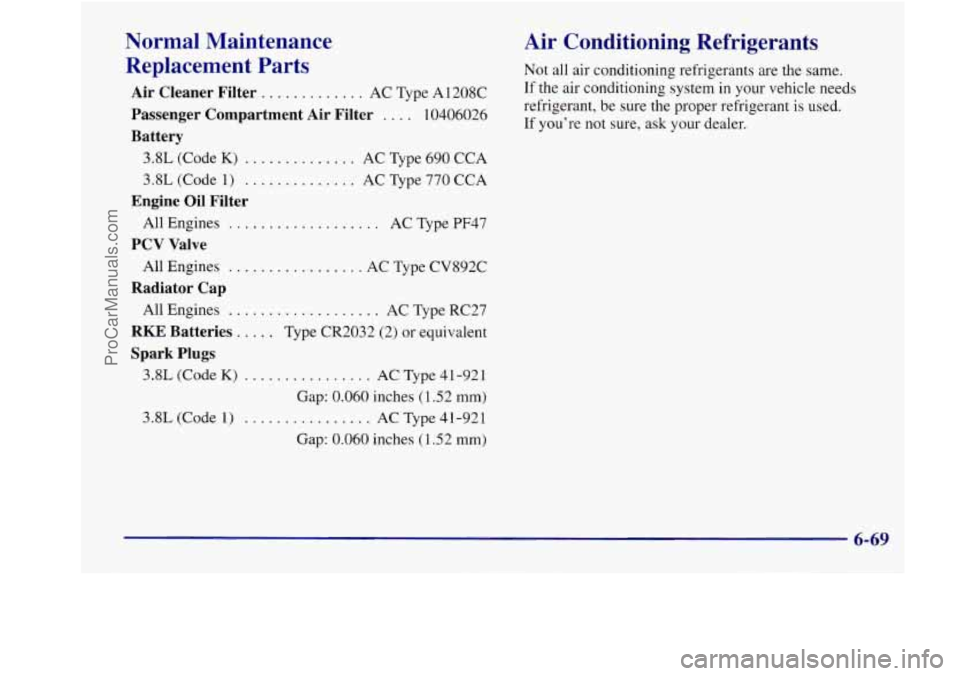
Normal Maintenance
Replacement Parts
Air Cleaner Filter ............. AC Type A 1208C
Passenger Compartment Air Filter .... 10406026
Battery
3.8L (Code K) .............. AC Type 690 CCA
3.8L (Code
1) .............. AC Type 770 CCA
All Engines
................... AC Type PF47
All Engines
................. AC Type CV892C
All Engines ................... AC Type RC27
RKE Batteries ..... Type CR2032 (2) or equivalent
Spark Plugs Engine Oil Filter
PCV Valve
Radiator Cap
3.8L (Code K) ................ AC Type 4 1-92 1
Gap:
0.060 inches (1.52 mm)
3.8L (Code 1) ................ AC Type 41-921
Gap: 0.060 inches (1.52 mm)
Air Conditioning Refrigerants
Not all air conditioning refrigerants are the same.
If the air conditioning system in your vehicle needs
refrigerant, be sure the proper refrigerant
is used.
If you’re not sure, ask your dealer.
6-69
ProCarManuals.com
Page 335 of 388
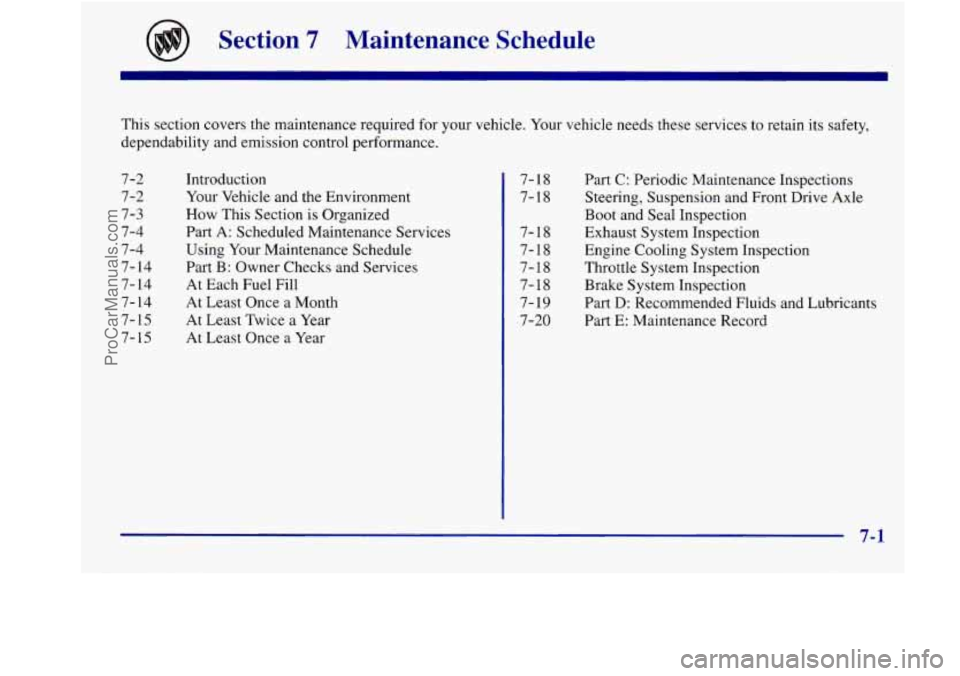
n
Section 7 Maintenance Schedule
This section covers the maintenance required for your vehicle. Your vehicle needs these services to retain its safety,
dependability and emission control performance.
7-2
7-2
7-3
7-4
7-4
7- 14 7- 14
7- 14
7- 15
7- 15
Introduction
Your Vehicle and the Envlronment
How This Section
is Organized
Part
A: Scheduled Maintenance Servlces
Using Your Maintenance Schedule
Part
B: Owner Checks and Services
At Each Fuel Fill
At Least Once a Month
At Least Twice a Year
At Least Once a Year
7-18
7- 18
7-18
7-18
7-18 7-18
7-19
7-20 Part C: Periodic Maintenance Inspections
Steering, Suspension and Front Drive Axle
Boot and Seal Inspection
Exhaust System Inspection
Engine Cooling System Inspection
Throttle System Inspection
Brake System Inspection
Part D: Recommended Fluids and Lubricants
Part
E: Maintenance Record
7-1
ProCarManuals.com
Page 339 of 388
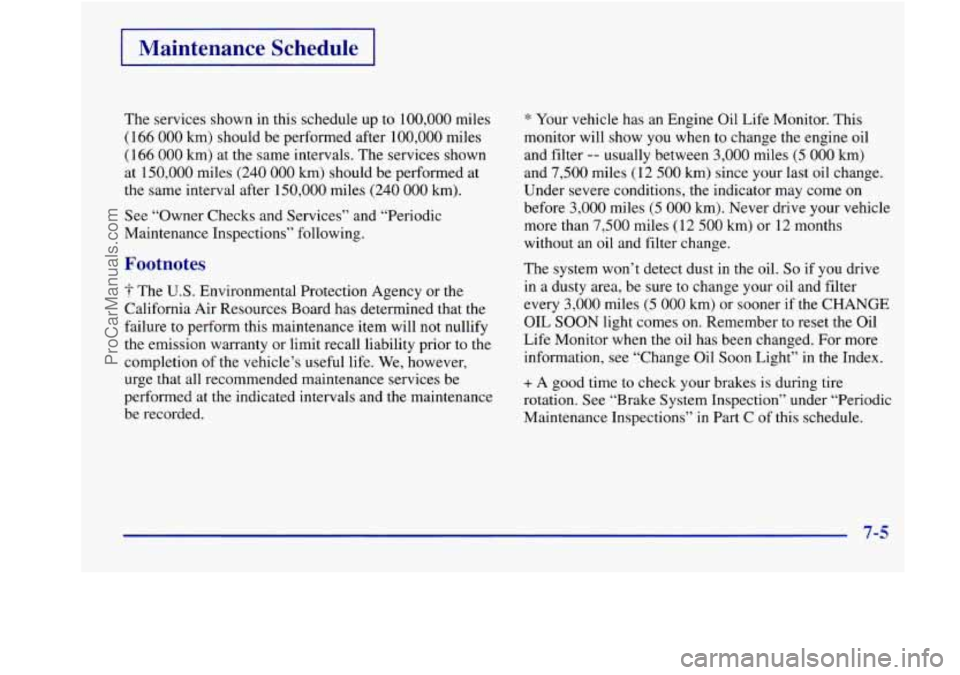
I Maintenance Schedule I
The services shown in this schedule up to 100,000 miles
(166
000 km) should be performed after 100,000 miles
(166
000 km) at the same intervals. The services shown
at 150,000 miles
(240 000 km) should be performed at
the same interval after
150,000 miles (240 000 km).
See “Owner Checks and Services” and “Periodic
Maintenance Inspections” following.
Footnotes
The U.S. Environmental Protection Agency or the
California Air Resources Board has determined that the
failure
to perform this maintenance item will not nullify
the emission warranty or limit recall liability prior to the
completion of the vehicle’s useful life. We, however,
urge that all recommended maintenance services be
performed at the indicated intervals and the maintenance
be recorded.
* Your vehicle has an Engine Oil Life Monitor. This
monitor will show you when to change the engine oil
and filter
-- usually between 3,000 miles (5 000 km)
and 7,500 miles (12 500 km) since your last oil change.
Under severe conditions, the indicator may come on
before
3,000 miles (5 000 km). Never drive your vehicle
more than
7,500 miles (12 500 km) or 12 months
without an oil and filter change.
The system won’t detect dust in the oil.
So if you drive
in a dusty area, be sure to change your oil and filter
every
3,000 miles (5 000 km) or sooner if the CHANGE
OIL SOON light comes
on. Remember to reset the Oil
Life Monitor when the oil has been changed. For more
information,
see “Change Oil Soon Light” in the Index.
+ A good time to check your brakes is during tire
rotation. See “Brake System Inspection” under “Periodic
Maintenance Inspections” in Part C of this schedule.
7-5
ProCarManuals.com